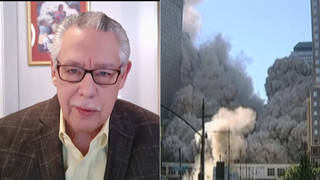
Guests
- Robert Reichformer labor secretary in the Clinton administration, academic and best-selling author.
We speak with former Labor Secretary Robert Reich about his new memoir, Coming Up Short, which tells his life story alongside the growth of inequality in America. Reich was born in 1946 as part of the baby-boom generation that enjoyed unprecedented levels of prosperity and social mobility in the decades after World War II. But he says those conditions were squandered as wealth concentration grew worse, labor unions were gutted and wages stagnated — helping to give rise to Donald Trump’s brand of authoritarianism. “We allowed big money to take over,” says Reich. “We, the baby boomers, although we did a lot of good things, we took for granted what we were given. … And Donald Trump is kind of the essence of what you do when you take your eyes off the prize.”
Transcript
AMY GOODMAN: Your whole life, as you’re a labor historian, is also about democracy. And I’m wondering if you can talk now, as we talk about firings, not only the threatened one at the Federal Reserve and the BLS, CDC, EPA, the gutting of regulations, etc., about the baby boomers? And this goes to your book, Coming Up Short: A Memoir of My America. You were born in 1946. And we’ll look at the trajectory of what’s changed in this country. 1946. Who is your birth cohort? Who else was born in 1946?
ROBERT REICH: Well, Bill Clinton, George W. Bush, Donald Trump, Dolly Parton, Cher. I mean, there are a lot of people born in 1946. But I think the point, certainly in the book, is that 1946 is the baby boom. That’s when the war was over. My father came home, and who was there, but my mother. And that was replicated all over America. That’s where the baby boom came from.
And the boomers inherited from what has been known as and come to be known as “the greatest generation,” my parents’ generation, because they went through the Depression and a war, and they sacrificed to make America really a better place. They fought the Axis powers. They fought the Nazis. They created an America that had the largest middle class that the world had ever seen.
Now, what did we, the baby boomers, do with that? I think, quite honestly, we did a lot of good things. I don’t want to tar with too broad a brush, but the fact of the matter is that by the late 1970s, the median wage in the United States stagnated. Adjusted for inflation, most Americans really didn’t see any improvement, even though they were working hard, even though they were playing by the rules, even though they were doing everything they were told to do. The social contract had been, if you do that, you will do better, and your children will do better. If companies do better, the employees of those companies will do better. Amy, that’s all — that all started to come apart.
And I think that what we are living with now, Donald Trump, is, in many respects, the consequence and the final sort of result of those years in which we took democracy for granted. We allowed big money to take over. We allowed all of that wealth and income to go to the top and to big corporations and — who monopolized the economy. We allowed labor unions to basically be busted by big corporations, to the point where, well, only 6% of American workers are now unionized. In other words, we, the baby boomers, although we did a lot of good things, we took for granted what we were given, the democracy, the institutions of our democracy. And Donald Trump is kind of the essence of what you do when you take your eyes off the prize.
AMY GOODMAN: You’re also describing a lot of bullying by more powerful entities and people. And that goes to your title, Coming Up Short, as you reference or joke about yourself. And you talk about growing up and what it meant to be bullied and who protected you.
ROBERT REICH: Well, I was — yes, there’s a double entendre there, obviously. And I am very short. And like many kids, I was bullied in school. But because I was very short, you know, a full head shorter than most of my peers, I was bullied in a way that made me really not want to go to school and on the bus and in the playground and, you know, in the boys’ room. And I didn’t know the word “humiliated,” but I certainly was humiliated. I felt powerless and vulnerable.
And then, years later, I learned that one of the older boys who had protected me, named Mickey Schwerner, Michael Schwerner, had, in 1964, gone to Mississippi to register voters and the real bullies of America. The Ku Klux Klan murdered Mickey and two other civil rights workers. And I think, Amy, that was the beginning of a fundamental change in my views of the world. I began to see bullying all over. It wasn’t just the schoolyard toughs bullying me. It was employers bullying employees, men bullying women, the stronger bullying the weaker, white supremacists bullying Black people. It was a — I was beginning to see that inside America there was so much bullying. And then, as inequality of income and wealth and political power began widening, that bullying intensified, until we got — Donald Trump is the bully of bullies. He is the bully-in-chief. He doesn’t know how to act other than bullying. That’s what we have now.
AMY GOODMAN: I just want to point out, it might surprise people, but it was 60 years ago this week that the bodies of Schwerner, Chaney and Goodman, two white voting rights activists and a Black voting rights activist, were found in a dam in Mississippi. Juan?
JUAN GONZÁLEZ: Yeah, Secretary Reich, I’d like to go back to this issue that you raised about the failure of the baby boomers and the golden era of the 1950s and '60s. Wasn't that due in large part, as well, to the fact that capitalism after World War II was faced now with the competition and the growth of national liberation movements and socialist countries around the world, so that Europe and the United States had to essentially engage in a social contract with their own working classes to prevent the further spread of socialism and communist ideas in the West, and that, in effect, it was the competition with a different type of economic system that paved the way for some of the improved lives of the European and American workers?
ROBERT REICH: Undoubtedly, Juan. That is absolutely right. But the interesting thing is that in the United States, we did not go nearly as far as the other rich countries, as Europe eventually did, as most — as Japan, as Australia, in terms of providing universal healthcare, access to higher education, access to free education, the kind of social safety nets that you find in other rich countries. We don’t even have paid sick leave, paid family and medical leave. We don’t have labor unions. I mean, again, 6% of our working people in the private sector are unionized. So, we — the American worker has been treated to the most harshest form of capitalism in the world.
And I think that, you know, that bullying I’m referring to, when Donald Trump comes along and says, in 2016, “I’m your savior,” or “I’m going to be” — you know, “I’m going to be your spokesperson,” what he’s really saying is, “I’m going to be your bully. I’m going to bully others, because you have been bullied.” And it was obviously a false promise, because he gives big tax cuts to the wealthy. He deregulates and gets rid of protections that working people need. But his rhetoric, his attitude is one as, you know, this swagger, as if he is — you know, he is the bully’s bully. He’s going to — he’s going to help working people really put down the coastal elites, the deep state, all of these, even immigrants. So, these are all bogeymen that he is creating to cover up from the fact that he is not dealing with the real sources of what has happened, the big money coming from big corporations and wealthy people that has infected and really forced our entire economy to be rigged in exactly the way that a lot of people suspect it’s been.
JUAN GONZÁLEZ: And I also wanted — in terms of bullying, I wanted to ask you about how Trump has been using his tariff wars to — really, not so much in economic terms, but in political terms, the way he has attempted to use tariffs to force countries to change their policies. For instance, his recent announcement of 40% tariff increase on Brazilian imports, even though Brazil does not have a trade surplus with the United States — it’s the other way around — and yet he is linking these tariffs to that country’s legal system’s treatment of the former President Jair Bolsonaro. And I’m wondering your thoughts on this, using tariffs as a club, as a political club, against other nations.
ROBERT REICH: Well, it’s an entire abuse of power, once again. Remember, the power to tariff, to impose customs, to change the rules of trade, is Congress’s power under the Constitution, Article I, Section 8. Trump has usurped that power, creating this kind of false emergency about balance of payments of trade debts. And then, not only does he usurp that congressional power, but then he uses this fake power to do things that, really, he has no right to do.
You mentioned imposing a huge tariff punishing Brazil for its treatment of Bolsonaro, punishing Lula in Brazil for treating Bolsonaro as exactly Trump was treated and as Bolsonaro should have been treated. I mean, just like Trump, he rejected the outcome of an election, and he led people to attack the government. But even in Canada, what Trump is saying, “You, Canadians, you should not — I am going to raise my tariffs on you, because you are potentially supporting, you’ve said publicly, a Palestinian state.”
Well, what in the world right does the president of the United States have to intrude on the politics of Brazil or the politics of Canada? And even if the president of the United States thought he had that right, he doesn’t have a right to do it through tariffs. And even if he thought he had a right to do it through tariffs, he doesn’t have a right to do it through tariffs that basically violate Article I, Section 8 of the Constitution, take that authority away from — away from Congress. You see, this is abuse piled on abuse piled on abuse.
AMY GOODMAN: Robert Reich, I want to thank you so much for being with us. Congratulations on the publication of your memoir, Coming Up Short: A Memoir of My America. Robert Reich, the former U.S. secretary of labor and a longtime professor of labor history at the University of California, Berkeley. Thank you so much.
ROBERT REICH: Thank you, Amy.
AMY GOODMAN: This is Democracy Now!, democracynow.org. Next up, 80 years ago today, the U.S. dropped the first atomic bomb in the world on Hiroshima. We’ll speak to reporter Greg Mitchell. Stay with us.
[break]
AMY GOODMAN: “Flesh Shapes the Day” by Tom Morello, performing during the Democracy Now! 20th anniversary in 2016. We’ll be celebrating our 30th anniversary next February.












Media Options